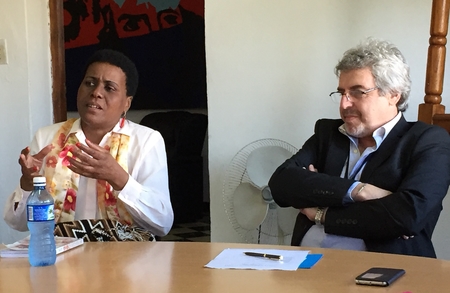
The GIE is a grouping of publishers associations from most countries in Latin American, plus Spain and Portugal, and offers an important forum to discuss strategic policy directions within Latin America, Spain and Portugal. Since the formation of the IPA’s Educational Publishers Forum-Americas at the end of last year, the GIE group has grown in importance for the IPA.
The GIE meeting coincided with the Feria Internacional del Libro de La Habana (Havana International Book Fair). José Borghino attended both the fair and the meeting, which was addressed by Zuleica Romay Guerra, president of the Instituto Cubano del Libro, the section of the Cuban Ministry of Culture responsible for organizing the book fair.
Asked about the strict state controls on publisher output (all publishers in Cuba are state-owned and overseas publishers can only trade during the book fair), Ms Romay Guerra was forthright about the problems and candid about the need for change. However, the government controls and subsidized book prices mean the Cuban ‘market’ is fundamentally different from its Western counterparts. Ms Romay Guerra also agreed to prepare a report, describing the structure and workings of the Cuban publishing and book distribution system, for the GIE’s next meeting, at the Buenos Aires Book Fair (20 April to 9 May 2016).
José Borghino said, “Royalty payments to authors are not part of the equation. There’s just a guaranteed up-front payment that bears little relation to the extremely low cover prices of the books on offer. Such financial dependence on the government favours a system of direct censorship and indirect self-censorship, and the absence of a market-driven royalty mechanism means it’s almost impossible for writers to be independent of government patronage and free to criticize what they choose.”
The Havana International Book Fair, in its 25th edition this year, is predominantly a commercial event, where publishers from all over the world showcase and sell books to the general public, while there is also a programme of professional panels for local and overseas publishers.
Held within the imposing walls of the San Carlos de la Cabaña fortress, which overlooks Havana, the book fair drew large crowds daily, but was especially well attended on the weekend of 13-14 February.
José Borghino said, “It was wonderful to see the fair so full of young Cubans keen to see what’s on offer from overseas publishing houses, then leaving laden with books. These eager readers were not being compelled by parents or grandparents; they wanted to be there and were enjoying the experience. It’s just unfortunate that part of their enthusiasm can be explained by the closed nature of the book market in Cuba during the rest of the year.”
Cuba has only recently begun to emerge from the isolation created by the USA-led embargo imposed by the Kennedy Administration in 1960. President Barack Obama has considerably eased those sanctions, and reestablished diplomatic relations.
José Borghino said, “It was encouraging to see a delegation of US publishers making their first ever visit to the Havana Book Fair this year. I believe this is just the beginning of growing links between US and Cuban publishers. Things are changing quickly in Cuban publishing, and it will be fascinating to see the impact of US and other publishers in the next few years.”

